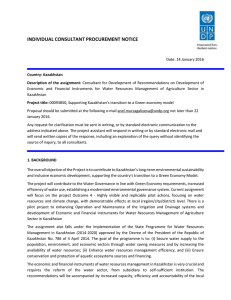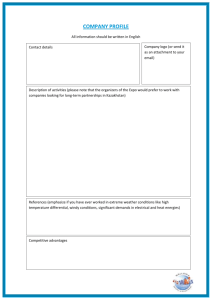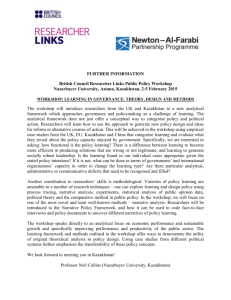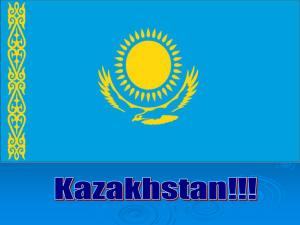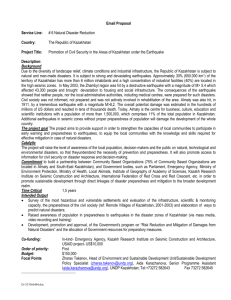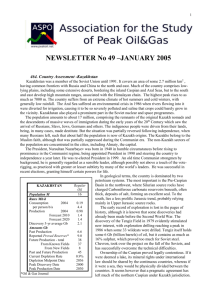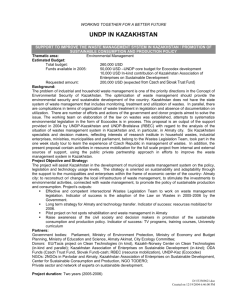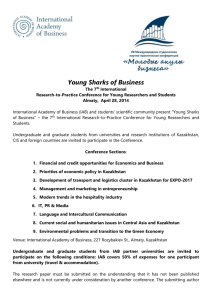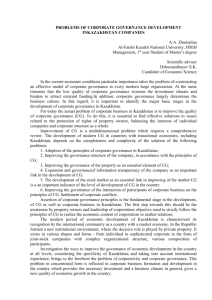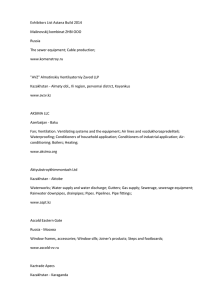Техническое задание должно содержать следующие разделы:
advertisement
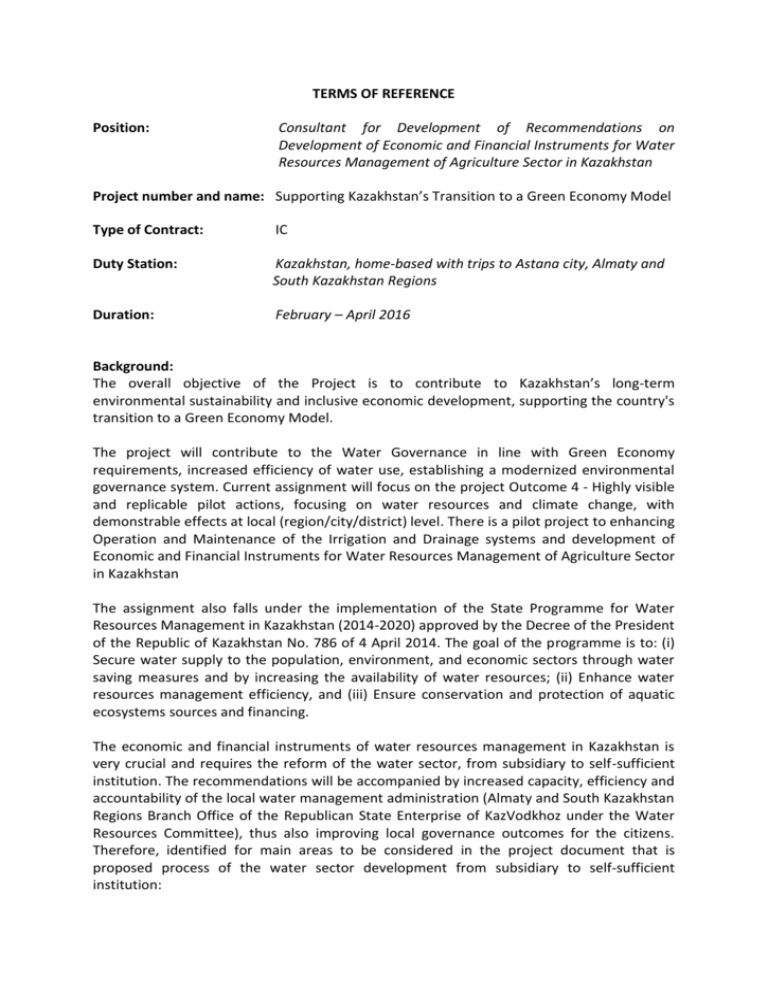
TERMS OF REFERENCE Position: Consultant for Development of Recommendations on Development of Economic and Financial Instruments for Water Resources Management of Agriculture Sector in Kazakhstan Project number and name: Supporting Kazakhstan’s Transition to a Green Economy Model Type of Contract: IC Duty Station: Kazakhstan, home-based with trips to Astana city, Almaty and South Kazakhstan Regions Duration: February – April 2016 Background: The overall objective of the Project is to contribute to Kazakhstan’s long-term environmental sustainability and inclusive economic development, supporting the country's transition to a Green Economy Model. The project will contribute to the Water Governance in line with Green Economy requirements, increased efficiency of water use, establishing a modernized environmental governance system. Current assignment will focus on the project Outcome 4 - Highly visible and replicable pilot actions, focusing on water resources and climate change, with demonstrable effects at local (region/city/district) level. There is a pilot project to enhancing Operation and Maintenance of the Irrigation and Drainage systems and development of Economic and Financial Instruments for Water Resources Management of Agriculture Sector in Kazakhstan The assignment also falls under the implementation of the State Programme for Water Resources Management in Kazakhstan (2014-2020) approved by the Decree of the President of the Republic of Kazakhstan No. 786 of 4 April 2014. The goal of the programme is to: (i) Secure water supply to the population, environment, and economic sectors through water saving measures and by increasing the availability of water resources; (ii) Enhance water resources management efficiency, and (iii) Ensure conservation and protection of aquatic ecosystems sources and financing. The economic and financial instruments of water resources management in Kazakhstan is very crucial and requires the reform of the water sector, from subsidiary to self-sufficient institution. The recommendations will be accompanied by increased capacity, efficiency and accountability of the local water management administration (Almaty and South Kazakhstan Regions Branch Office of the Republican State Enterprise of KazVodkhoz under the Water Resources Committee), thus also improving local governance outcomes for the citizens. Therefore, identified for main areas to be considered in the project document that is proposed process of the water sector development from subsidiary to self-sufficient institution: 1. Institutional development of Water Resources Committee and national/regional branch offices KazVodkhoz and building capacity for advanced water management system 2. Development of the economic and financial instruments for water metering and billing system in irrigation and water resources management in agriculture sector 3. Awareness raising of the rural communities, farmers and operation staff of Water Resources Committee (especially KazVodkhoz) on water use efficiency and using water metering and billing system, and 4. Detail analysis of economic and financial instruments in water resources management in agriculture sector and recommendations to Government of Kazakhstan to reform the sector based on the best practices demonstrated in the project. Objective: The main objective of the work is providing technical support, knowledge sharing and national/international best practices to the Project Manager on introducing green technologies on water resources management including tariff, water billing, advance methods to detect loses in the irrigation and drainage system. Scope of work: The consultant is the key expert on development of project document. The project consultant will: 1. Conduct baseline study and stakeholder analysis: Review current situation on all relevant baseline information and current policy and practices related to the subject Identify national and regional key project stakeholders and partners, including analyzing and (documented) consultations in view of their future/potential role during the implementation phase; 2. Work closely with appropriate water management professionals and institutions at the national and local level in order to achieve basic consensus on scale, content and format of the main project phase 3. Coordinate the development of all components for the main project implementation phase in full detail and drafting the project documentation following the specific UNDP requirements, which will include (but not be limited to): Project time frame, outcomes, outputs and activities (including a logical framework and monitoring and evaluation framework); Detailed budget with endorsed financial inputs (cash and in-kind); Implementation and management arrangement; roles and responsibilities of project implementation partners; Strategy for key national and regional stakeholder participation and involvement; TORs, institutional and programme analysis, capacity building/training plans, awareness raising, communication and outreach strategy, water billing system and all other relevant annexes as needed; Other elements and components, as needed, to ensure completeness, feasibility and potential effectiveness and efficiency of the planned project implementation phase; Develops a description of the social, economic and financial sustainability of proposed project activities. Finalizes the project logical framework, with particular emphasis on water indicators, Coordinates the development of the stakeholder involvement plan, Feasibility analysis of different options for the implementation of the project activities and project governance. This will include the selections and detailed description of the preferred implementation and governance arrangements for the project. Describes roles, functions and responsibilities of different players (governmental, research, financial institutions, NGOs/CSOs) with respect to regulating, planning, implementing activities Defines the capacity of the key national stakeholders to implement and sustain the proposed project activities, including recommendations for building capacity integration into the project design; Designs project monitoring and evaluation plan, and budget Develops a costing table for all expected project outcomes and outputs, Prepare the relevant description for the Project Document – threats analysis matrix and narrative and logframe with clear indicators for the objective and outcome level, including the baseline and target values for the indicators; Prepare a cost-effectiveness analysis for the full project; Assist in the preparation of the monitoring and evaluation framework and plan; The main overall deliverable under this TOR will be the finalized project documentation package, with all its elements and components, agreed upon by all stakeholders and project partners, fully co-financed and ready for incepting the Implementation Phase (2016-2018). Expected results and payments: No. 1. 2. Results Detailed work and mission plan with timeline and clear deliverables, initial list of key stakeholder consultations, TORs for national consultants – to be submitted to UNDP for endorsement; Based on the approved detailed work and mission plan, conduct at least two missions (mission reports provided after completion of each mission) Organize and conduct (a) 1st mission stakeholder meeting(s) to present and verify the planned new project – the draft project documentation and all deliverables under this TOR will be considered acceptable only if the relevant key stakeholders will agree on its main strategy and components from a Timing Amount (optional) February, 2016 20% March 2016 40% 3. technical, financial, and especially political point of view; Draft Project Document and sent for review and clearance Organized and conducted (a) 2nd mission - Validation Workshop; Based on the Validation Workshop comments and on the feedback from reviewers, draft the final and complete Project Documentation with all its elements and components (in English) – to be finalized; Final Project Document ready for submission for signature by Implementing Agencies April 2016 40% Responsibility: Reports to Programme Officer/Acting Head of EE Unit. Ensures timely and quality execution of the Terms of Reference Ensures unconditional carrying out of requirements of the Contract Travel: In the course of the assignment, the expert is expected to visit Astana city, Almaty and South Kazakhstan Regions. The exact dates for the missions will be agreed with the Project Manager Responsibility: Reports to Project Manager and Programme Officer of EE Unit Ensures timely and quality execution of the Terms of Reference Ensures unconditional carrying out of requirements of the Contract Knowledge and skills: Higher education in the sphere of water resources management, engineering, finance, public administrations or related spheres Professional qualifications with at least ten (10) years of professional experience At least 5 years of work experience as a project development, implementation and work experience in multi-sector project management; Good awareness on objectives and procedures of international organizations, in particular, on UNDP and its partners (Government, GEF, EU, UNECE, IFIs, large NGOs, current and potential donors) is preferable; Experience in the related projects; Work experience with government bodies, representatives of local government, civil society organizations, academic societies; Good capacities for strategic thinking, planning and management; Experience in planning and holding workshops, etc.; Experience in establishment of cooperation with stakeholders, institutions and organizations. Good computer skills; Knowledge of UNDP project development, implementation procedures, including procurement, disbursements, and reporting and monitoring will be an added advantage. Project ID COA (MUST BE INDICATED IN NUMBERS) Dept Activity Account Amount Fund ID 71300 Total: Agreed by: Gulzhamal Issayeva, Project manager signature date Impl Agency Donor

